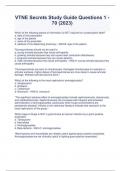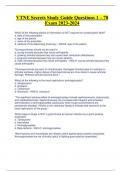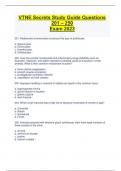Vtne secrets study guide - Study guides, Class notes & Summaries
Looking for the best study guides, study notes and summaries about Vtne secrets study guide? On this page you'll find 3 study documents about Vtne secrets study guide.
All 3 results
Sort by

-
VTNE Secrets Study Guide Questions 1 - 70 (2023)
- Exam (elaborations) • 21 pages • 2023
-
- $9.99
- + learn more
VTNE Secrets Study Guide Questions 1 - 70 (2023) Which of the following pieces of information is NOT required on a prescription label? a. date of the prescription b. age of the patient c. name of the prescriber d. address of the dispensing pharmacy - ANS-B: Age of the patient Fluoroquinolones should not be used in: a. young animals because they cause arthropathy b. growing animals because they can cause heart conduction disturbance. c. pregnant animals because they can cause abortion...

-
VTNE Secrets Study Guide Questions 1 – 70 Exam 2023-2024
- Exam (elaborations) • 21 pages • 2023
-
- $13.99
- + learn more
VTNE Secrets Study Guide Questions 1 – 70 Exam 2023-2024 Which of the following pieces of information is NOT required on a prescription label? a. date of the prescription b. age of the patient c. name of the prescriber d. address of the dispensing pharmacy - ANS-B: Age of the patient Fluoroquinolones should not be used in: a. young animals because they cause arthropathy b. growing animals because they can cause heart conduction disturbance. c. pregnant animals because they can caus...

-
VTNE Secrets Study Guide Questions 201 – 250 Exam 2023
- Exam (elaborations) • 9 pages • 2023
-
- $7.99
- + learn more
VTNE Secrets Study Guide Questions 201 – 250 Exam 2023 201. Rattlesnake envenomation produces this type of poikilocyte: a. Spherocytes b. Echinocytes c. Acanthocytes d. Schistocytes - 202. Over-the-counter nonsteroidal anti-inflammatory drugs (NSAIDs) such as ibuprofen, naproxen, and aspirin represent a leading cause of toxicoses in small animals. What is their common mechanism of action? a. bone marrow suppression b. smooth muscle contraction c. prostaglandin synthesis inhi...

How did he do that? By selling his study resources on Stuvia. Try it yourself! Discover all about earning on Stuvia


